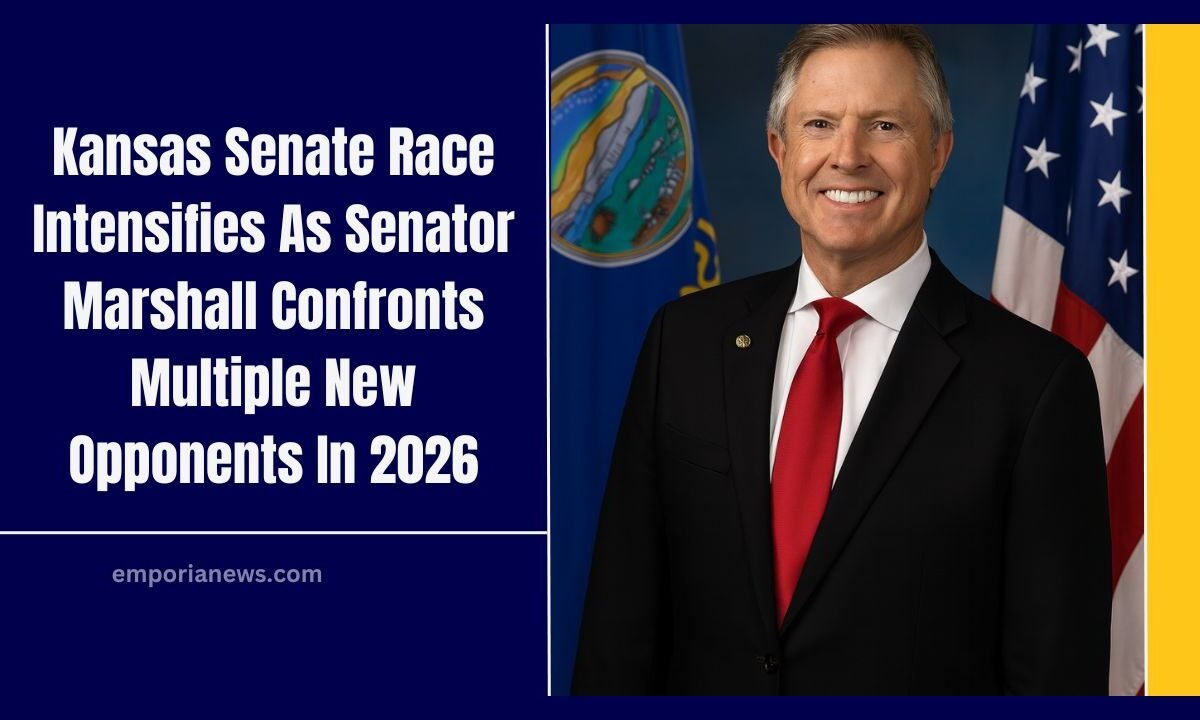Though the 2026 U.S. Senate election in Kansas is over a year away (scheduled for November 3, 2026), the heat is building fast.
Senator Roger Marshall, a first-term Republican elected in 2020 with 53.2% of the vote, has confirmed plans to run again. But mounting challenges and visible public protests signal this race is far from predetermined.
Candidates & Campaign Field
| Category | Details |
|---|---|
| Incumbent | Senator Roger Marshall (Republican), first elected in 2020 with 53.2% |
| Declared Opponents | Christy Davis, Anne Parelkar, Mike Soetaert (Democrats) |
| Opposition Sentiment | Public protests in Wichita and other cities demanding accountability |
| Marshall’s Response | Did not take questions at a recent forum and has stayed off the record |
| Election Context | Far in advance—political experts note dynamics can shift significantly |
Fueled by Public Dissent
Across Kansas, public protests have become a frequent backdrop. In Wichita, demonstrators gathered outside an event where Senator Marshall was speaking, voicing their opposition and demanding greater responsiveness from their elected official.
Signs and chants, some referencing his ties to nearby Florida, underscored the growing frustration among constituents.
Challengers Entering the Race
- Christy Davis, a Democrat from Cottonwood Falls and former USDA Rural Development director, has announced her campaign, citing Marshall’s partisan alignment and inadequate constituent outreach.
- Anne Parelkar, an attorney from Overland Park, launched her candidacy after attending one of Marshall’s town halls. She expressed frustration over limited opportunities for public questioning and called for better transparency.
- Mike Soetaert, a businessman, has also filed paperwork and officially entered the Democratic primary field.
Other names—such as Jim Dubois—have also joined, signaling a competitive and crowded contest ahead.
Political Dynamics in Play
Kansas remains a Republican-leaning state and hasn’t elected a Democratic U.S. Senator since 1932.
However, with both quality challengers and mounting voter discontent, political analysts emphasize the fluid nature of this race—especially since it’s still early. Dr. Russell Arben Fox, a political science professor, notes.
“If voter dissatisfaction and energy among the opposition persist a year from now, it could reshape expectations.”
Marshall’s Defensive Approach
At a recent Wichita forum hosted by the Chamber of Commerce, Senator Marshall delivered a speech but avoided taking questions. Inside, his supporters praised his stance on mental health, agriculture, EPA policy, and flood mitigation.
But outside, the echo of opposition—a stark visual reminder of rising discontent—couldn’t be ignored.
Looking Ahead to 2026
As the 2026 primary race unfolds, key factors will determine the outcome:
- Can challengers generate sustained momentum through fundraising, grassroots mobilization, and party support?
- Will protests translate into voter shifts or remain symbolic?
- Will Senator Marshall engage directly with constituents and reinvigorate his base to counter mounting criticism?
The 2026 Kansas U.S. Senate race is rapidly gaining intensity. Senator Roger Marshall faces a strong and growing Democratic field—including Christy Davis, Anne Parelkar, and Mike Soetaert—as well as public protests demanding accountability.
While Kansas has long been a Republican stronghold, the political landscape is shifting. If challenger energy and voter discontent hold steady, this could become one of the state’s most closely watched contests in decades.




